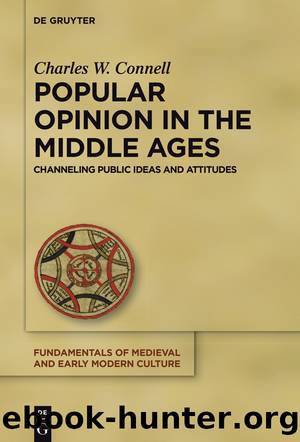Popular Opinion in the Middle Ages by Charles W. Connell

Author:Charles W. Connell
Language: eng
Format: epub
Publisher: Walter de Gruyter
Published: 2016-02-15T00:00:00+00:00
Physical Public Space as Medieval Public Sphere
For the past quarter century the study of the public has been offered new stimulation by the English translation of the work of Jürgen Habermas, who offered scholars an understanding of public dialogue and rational opinion formation which he labeled Ãffentlichkeit, a term that has been translated in English, incorrectly some have argued, as the âpublic sphere.â931 Although he placed its origins in the Enlightenment, many scholars since then have tried to push it back in historical time. Habermas began by asking whether rational arguments among companies of men could reach a consensus to form a persuasive basic for political action. His âcompany of menâ was elitist in nature and on this basis the argument was immediately challenged widely. Habermas clearly struck a nerve, and the energy generated by the shock has not gone away, as witness several redefinitions of the public sphere by scholars from many perspectives.932 A number of medievalists for that matter see its first arising in the debates of the Investiture Contest, the market places of England, and the theatres of Arras, as we discuss further below in this chapter.
One of the most thoughtful reviews of the impact of Habermas was put forth by Harold Mah in 2000 who argues that historians have âspatializedâ the public sphere by âconceiving of it as a space or domain of free expression and argument that is accessible to any social group,â which has led to a wrongful interpretation of Habermas and neglected much that could be more usefully applied.933 Mah questions the translation of Ãffentlichkeit as a âspaceâ that one can enter and leave. He argues that social and cultural historians have selected this connotation because they study dissenting groups. Like Edward Thompson in his classic The Making of the English Working Class, they want to demonstrate agency for marginal groups. By conceiving of the public space as a medium for dialogue among dissenting groups, it becomes a place that âcrystallizes the process by which a distinct social group comes to define itself as a group.â934
Relative to the Middle Ages, Mah points out that Habermas did conceive of a premodern form of public expression which he rather vaguely called ârepresentative publicness.â He went on to explain this did not mean representative government, but rather it was âthe presentation of self to others in such a way that what one was presenting was oneâs social status and corporate membership,â which, for example, could be interpreted as the medieval elite presenting themselves to the common people in various public displays as âa means of making a privileged social particularity.â935 However, Habermas did not allow for the term to mean a public expression of beliefs in the medieval world, such as the case of the Cathars who it might be argued asserted a representative publicness and a form of public identity that was deemed necessary for them to be declared heretics. Nor would Mah allow such an interpretation, because if a social group came into the
Download
This site does not store any files on its server. We only index and link to content provided by other sites. Please contact the content providers to delete copyright contents if any and email us, we'll remove relevant links or contents immediately.
| Africa | Americas |
| Arctic & Antarctica | Asia |
| Australia & Oceania | Europe |
| Middle East | Russia |
| United States | World |
| Ancient Civilizations | Military |
| Historical Study & Educational Resources |
Machine Learning at Scale with H2O by Gregory Keys | David Whiting(4313)
Never by Ken Follett(3957)
Fairy Tale by Stephen King(3399)
Oathbringer (The Stormlight Archive, Book 3) by Brandon Sanderson(3217)
The Man Who Died Twice by Richard Osman(3081)
Will by Will Smith(2920)
Rationality by Steven Pinker(2366)
Can't Hurt Me: Master Your Mind and Defy the Odds - Clean Edition by David Goggins(2342)
The Dark Hours by Michael Connelly(2311)
Friends, Lovers, and the Big Terrible Thing by Matthew Perry(2230)
The Dawn of Everything: A New History of Humanity by David Graeber & David Wengrow(2210)
Principles for Dealing With the Changing World Order: Why Nations Succeed and Fail by Ray Dalio(2055)
A Short History of War by Jeremy Black(1849)
HBR's 10 Must Reads 2022 by Harvard Business Review(1845)
Go Tell the Bees That I Am Gone by Diana Gabaldon(1758)
A Game of Thrones (The Illustrated Edition) by George R. R. Martin(1746)
Kingdom of Ash by Maas Sarah J(1684)
515945210 by Unknown(1668)
443319537 by Unknown(1560)
